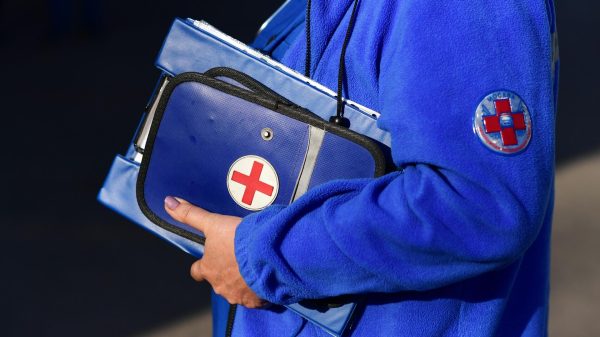As Congress remains deadlocked on a new coronavirus economic stimulus package, two new studies show at least 6 million more people in the US are in poverty due to the effects of the Covid-19 pandemic.
A study from Columbia University published on Thursday found that the number of Americans in poverty grew by 8 million since May.
Jobless America: the coronavirus unemployment crisis in figures
Read more
Looking at the monthly poverty rates for American families from October 2019 to September 2020, the study found that the number of families in poverty has been gradually rising since March 2020, but the Cares Act, the original coronavirus economic relief package, prevented 18 million families from going into poverty in March and April.
Without that stimulus package, the poverty rate would have jumped from 12% in March to 19.4% in April. Instead, it was 13.9%, the study found.
The effects of the Cares Act’s direct relief to Americans – a one-time maximum $1,200 stimulus check to individual Americans and an additional $600 in unemployment insurance a week on top of their state benefits – has rapidly diminished since the end of the summer when the additional unemployment insurance expired.
Since then, monthly poverty rates have grown closer to what researchers estimate rates would have been without the Cares Act. The poverty rates in August and September were 17.3% and 16.7%, respectively. Without the stimulus package, researchers would have expected rates of 18.7% and 18% in those months, respectively.
The Cares Act only contributed to a 1.3% reduction in poverty rates in September, according to the study, that can be attributed to the bill’s creation of a program, which ends at the end of the year, that expands unemployment insurance to contractors and freelancers.
The study notes that the growth of poverty has been most acute for Black and Hispanic Americans, who have seen unemployment rates almost twice that of white Americans during the pandemic. Black and Hispanic Americans both have poverty rates of about 25%, up from 23% for both groups in January, while White Americans have a poverty rate of 12%, up from 11.2% in January.
The findings of the Columbia study echoed that of a study published jointly by the University of Chicago and the University of Notre Dame earlier this week that showed a similar rise in poverty over the last few months.
Using data from the Census Bureau’s monthly Current Population Survey, the study estimated that the number of poor Americans grew by 6 million people over the last three months. Poverty rates grew from 9.4% in April through June to 10.8% in August and September.
Researchers of the study also found a direct relation between poverty rates and the Cares Act, noting that the stimulus package actually led to a decline in poverty in the early months of the pandemic. The study also found a similar disparity in poverty rates between white and Black Americans.
Authors of both studies urged Congress to use their findings as the basis for future stimulus policies.
“For low-income individuals and families, the government response to the pandemic more than offset the sharp decline in earnings early on in the pandemic. However, these gains appear to have faded as some of the benefits expire,” said the authors of the University of Chicago and Notre Dame study in a statement.
The Cares Act was passed on 27 March, and there has been no other major stimulus package passed by both the House and Senate since.
On Thursday it was looking increasingly unlikely that Democrats and Republicans will be able to reach agreement on a new coronavirus economic stimulus package before the 3 November election – and perhaps not even before the end of the year.
The Democrat-controlled House has passed two multitrillion-dollar packages since May, while the Republicans passed a $1tn bill in July, but without agreement by both chambers of Congress, no legislation will be enacted.
With the Republican Senate busy with the confirmation of Amy Coney Barrett to the supreme court, it is unclear when a second stimulus package will be passed.

















































Свежие комментарии